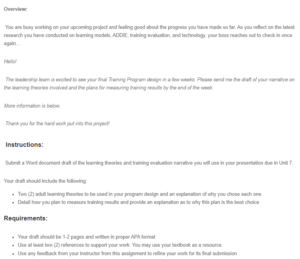Learning Theories and Evaluation Draft
Learning Theories
Adult learning theories describe how professionals learn by instructing the trainer on designing learning programs that will meet professionals’ needs at every phase of their career path (Bélanger, 2011). The two adult learning theories that will be used in our program design are andragogy and self-directed learning adults and theories. Andragogy learning theories posit that adults and children learn differently. The foundation for this argument includes the fact that adults have an existing background of knowledge gathered through life experiences and therefore focus on continuous learning based on personal needs, wants, and interests, and understand why they are learning, thus being highly motivated (Wang, 2009). This theory has been chosen because it accommodates our training strategy by enabling trainees to work things out independently and organize their schedules to attend all training sessions on time.
The self-directed learning theory is the process where learners take the initiative in their learning by planning, carrying out, and evaluating their learning experiences without being helped by anyone. It posits that learners set goals, determine their training and educational needs, implement a plan, and discover ways to improve their learning (Bélanger, 2011). Self-directed learning requires learners to select and access the most appropriate learning hence the involvement of mentors, teachers, and peers. This theory has been chosen because the training requires trainees to be self-motivated and take the initiative to enhance the effectiveness of the training program by collaborating with trainees to design training strategies that fit each trainee’s needs.
Training Evaluation
Measuring training results focuses on determining if the objectives of the training program have been met and areas of improvement in the training program (Noe, 2016). Our training evaluation process will include evaluating participants’ immediate reactions and training events, job performance outcomes, participants’ learning, and organizational change and performance. One of the techniques that will be used to measure training results will be self-assessment questionnaires that all trainees will fill out. The questionnaires will include open and closed questions on whether or not the trainees enjoyed the delivery of the training program, whether the content in the training program was appropriate, or whether they received good training support. The trainees will also be asked for a recommendation on areas of improvement. Evaluating the appropriateness of the training content will offer valuable insight on how the content of similar training programs can be altered to be more effective. The questionnaires will also include questions evaluating specific training events to determine whether the events in training were effective and practical or not.
The second technique will be competency tests. The tests will evaluate the competencies developed from the training to access individual learning. According to Brown (2021), accessing individual learning is vital in gaining insight into the training outcomes by proving how practical the training was. The competency tests’ results and the completed questionnaires will then be assessed by external evaluators who will be individuals not directly involved in the training. Using an external evaluator will ensure that there is no bias in interpreting data, thus enhancing the credibility of the evaluation outcome. Competency tests and self-administered questionnaires are the best techniques because they allow the trainees to freely express their opinions on the training program and how it benefited them. The plan was also selected because it does not require a lot of resources. After all, the competency tests and questionnaires may be sent to trainees via email.
References
Brown, C. (2021). Methods of evaluation of community health worker training. Training for Community Health, 157-176. https://doi.org/10.1093/oso/9780198866244.003.0010
Bélanger, P. (2011). Theories in adult learning and education. Verlag Barbara Budrich.
Noe, R. (2016). Employee training & development. McGraw-Hill Education.
Wang, V. (2009). Andragogy and pedagogy in learning theories. Encyclopedia of Human Resources Information Systems, 42-47. https://doi.org/10.4018/9a78-1-59904-883-3.ch007
ORDER A PLAGIARISM-FREE PAPER HERE
We’ll write everything from scratch
Question 

Learning Theories and Evaluation Draft
Overview:
You are busy working on your upcoming project and feeling good about the progress you have made so far. As you reflect on the latest research you have conducted on learning models, ADDIE, training evaluation, and technology, your boss reaches out to check in once again…
Hello!
The leadership team is excited to see your final Training Program design in a few weeks. Please send me the draft of your narrative on the learning theories involved and the plans for measuring training results by the end of the week.
More information is below.
Thank you for the hard work put into this project!
Instructions:
Submit a Word document draft of the learning theories and training evaluation narrative you will use in your presentation due in Unit 7.
Your draft should include the following:
- Two (2) adult learning theories to be used in your program design and an explanation of why you chose each one
- Detail how you plan to measure training results and provide an explanation as to why this plan is the best choice
Requirements:
- Your draft should be 1-2 pages and written in proper APA format
- Use at least two (2) references to support your work. You may use your textbook as a resource.
- Use any feedback from your instructor from this assignment to refine your work for its final submission